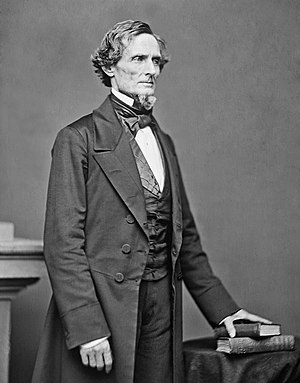“If the Confederacy fails, there should be written on its tombstone: Died of a Theory.”
If the recommendation above, made for the training of
forty thousand negroes for the service indicated, shall meet
your approval, it is certain that even this limited number, by
their preparatory training in intermediate duties, would form a
more valuable reserve force in case of urgency than threefold
their number suddenly called from field-labor, while a fresh
levy could to a certain extent supply their places in the
special service for which they are now employed."
Subsequent events advanced my views from a prospective to a present need
for the enrollment of negroes to take their place in the ranks.
Strenuously I argued the question with members of Congress who called to
confer with me. To a member of the Senate (the House in which we most
needed a vote) I stated, as I had done to many others, the fact of
having led negroes against a lawless body of armed white men, and the
assurance which the experiment gave me that they might, under proper
conditions, be relied on in battle, and finally used to him the
expression which I believe I can repeat exactly: "If the Confederacy
falls, there should be written on its tombstone, 'Died of a theory.'"
General Lee was brought before a committee to state his opinion as to
the probable efficiency of negroes as soldiers, and disappointed the
probable expectation by his unqualified advocacy of the proposed
measure.
After much discussion in Congress, a bill authorizing the President to
ask for and accept from their owners such a number of able-bodied negro
men as he might deem expedient subsequently passed the House, but was
lost in the Senate by one vote. The Senators of Virginia opposed the
measure so strongly that only legislative instruction could secure their
support of it. Their Legislature did so instruct them, and they voted
for it. Finally, the bill passed, with an amendment providing that not
more than twenty-five per cent. of the male slaves between the ages of
eighteen and forty-five should be called out. But the passage of the act
had been so long delayed that the opportunity was lost. There did not
remain time enough to obtain any result from its provisions.
“All we ask is to be let alone.”
Philip, and
Pulaski, nineteen thousand men, and sixteen thousand more were on their
way to Virginia; that it was proposed to organize and hold in readiness
for instant action, in view of the existing exigencies of the country,
an army of one hundred thousand men; and that, if a further force should
be needed, Congress would be appealed to for authority to call it into
the field. Finally, that the intent of the President of the United
States, already developed, to invade our soil, capture our forts,
blockade our ports, and wage war against us, rendered it necessary to
raise means to a much larger amount than had been done, to defray the
expenses of maintaining independence and repelling invasion.
A brief summary of the internal affairs of the Government followed, and,
notwithstanding frequent declarations of the peaceful intentions of the
withdrawing States had been made in the most solemn manner, it was
deemed not to be out of place to repeat them once more; and, therefore,
the message closed with these words: "We protest solemnly, in the face
of mankind, that we desire peace at any sacrifice, save that of honor.
In independence we seek no conquest, no aggrandizement, no concession of
any kind from the States with which we have lately been confederated.
All we ask is to be let alone--that those who never held power over us
shall not now attempt our subjugation by arms. This we will, we must,
resist to the direst extremity. The moment that this pretension is
abandoned, the sword will drop from our grasp, and we shall be ready to
enter into treaties of amity and commerce that can not but be mutually
beneficial. So long as this pretension is maintained, with a firm
reliance on that Divine Power which covers with its protection the just
cause, we must continue to struggle for our inherent right to freedom,
independence, and self-government."
At this session Congress passed acts authorizing the President to use
the whole land and naval force to meet the necessities of the war thus
commenced; to issue to private armed vessels letters of marque; in
addition to the volunteer force authorized to be raised, to accept the
services of volunteers, to serve during the war; to receive into the
service various companies of the different arms; to make a loan of fifty
millions of dollars in bonds and notes; and to hold an election for
officers of the permanent Government under the new Constitution.
